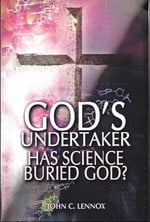
Paperback, 192pp. Published by Lion Hudson plc, Wilkinson House, Jordan Hill Road, Oxford, OX2 8DR. Price £8.99, ISBN 978-0-745953-03-8.
This book should be required reading for pupils and students who find themselves on the ‘back foot’ when faced with teachers and lecturers who have become infected with what Professor Alister McGrath has termed ‘The Dawkins Delusion’. The author of this important work is well-qualified to silence the strident voices of the militant atheists so often heard unchallenged in the media. The purpose of the book is succinctly summarized on its back cover: ‘Atheism, we are told, is the only intellectually tenable position, and any attempt to re-introduce God is likely to impede the progress of science … John Lennox invites us to consider such claims carefully. Is it really true, he asks, that everything in science points to Atheism? Could it be possible that Theism sits more comfortably with science than Atheism? Has science buried God or not?’
The author then proceeds to dismantle a wide range of commonly-held prejudices and assumptions, which have so often obscured the truth. He exposes many of the logical fallacies in the arguments of the humanists. After setting the scene in his Preface, he takes the reader through conflicting world-views, the scope and limits of science, design in the universe, the nature and scope of evolution, origin of life, the genetic code and its origin, and aspects of information. An epilogue summarizes his conclusions and moves the reader on to a personal Creator who has revealed Himself fully and finally in the One who is the Word made flesh. Dr. Lennox is courteous and scrupulously fair as he weighs the evidence for and against his main thesis.
Having begun his task by asking the fundamental question, ‘Why is there something rather than nothing?’, he concludes by highlighting the ultimate choice we all must make. ‘Inevitably, of course … all of us have to choose the presupposition with which we start. There are not many options – essentially just two. Either human intelligence ultimately owes its origin to mindless matter or there is a Creator. It is strange that some people claim that it is their intelligence that leads them to prefer the first to the second’.
This book is not undemanding reading. By the very nature of his subject the author requires the reader to follow his argument closely. The rewards are considerable. The result will be the strengthening of an intelligent faith in the Creator and His revelation. After reading this book, no one will ever look at Aunt Matilda’s cake in the same way again!
[Our thanks to Ed Hotchin, Hucknall, Nottingham, UK, for this review]
| Cookie | Duration | Description |
|---|---|---|
| cookielawinfo-checkbox-advertisement | 1 year | Set by the GDPR Cookie Consent plugin, this cookie is used to record the user consent for the cookies in the "Advertisement" category . |
| cookielawinfo-checkbox-analytics | 11 months | This cookie is set by GDPR Cookie Consent plugin. The cookie is used to store the user consent for the cookies in the category "Analytics". |
| cookielawinfo-checkbox-functional | 11 months | The cookie is set by GDPR cookie consent to record the user consent for the cookies in the category "Functional". |
| cookielawinfo-checkbox-necessary | 11 months | This cookie is set by GDPR Cookie Consent plugin. The cookies is used to store the user consent for the cookies in the category "Necessary". |
| cookielawinfo-checkbox-others | 11 months | This cookie is set by GDPR Cookie Consent plugin. The cookie is used to store the user consent for the cookies in the category "Other. |
| cookielawinfo-checkbox-performance | 11 months | This cookie is set by GDPR Cookie Consent plugin. The cookie is used to store the user consent for the cookies in the category "Performance". |
| elementor | never | This cookie is used by the website's WordPress theme. It allows the website owner to implement or change the website's content in real-time. |
| viewed_cookie_policy | 11 months | The cookie is set by the GDPR Cookie Consent plugin and is used to store whether or not user has consented to the use of cookies. It does not store any personal data. |